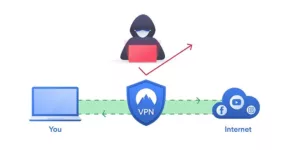In an increasingly digital world, the need for online privacy and security has become paramount. Virtual Private Networks, or VPNs, have gained immense popularity as tools that offer anonymity, data encryption, and unrestricted access to online content. While there are both paid and free VPN options available for Windows users, this article will delve into the pros and cons of utilizing free VPNs for Windows.
Benefits of Free VPNs for Windows
- Cost-Efficiency: The most apparent advantage of using a free VPN for Windows is the absence of a financial commitment. Users can enjoy many of the basic features of a VPN without having to pay a subscription fee.
- Anonymity and Privacy: Free VPNs can provide an extra layer of privacy by masking a user’s IP address. This makes it challenging for websites and online services to track browsing habits and personal information.
- Access to Restricted Content: Some free VPNs offer users the ability to bypass geographic restrictions and access content that might be blocked in certain regions. This can be particularly beneficial for users looking to access streaming services or websites that are not available in their country.
- Public Wi-Fi Security: Free VPNs can be useful when connecting to public Wi-Fi networks, which are often less secure and more susceptible to cyberattacks. The encryption provided by a VPN can help protect sensitive data from potential hackers.
- Circumvention of Censorship: In regions with strict internet censorship, a free VPN can help users bypass these restrictions and access the open internet.
Risks and Limitations of Free VPNs for Windows
- Limited Features: Free VPNs typically offer a limited set of features compared to their paid counterparts. This can include restricted server locations, slower connection speeds, and a smaller number of supported devices.
- Data Logging and Privacy Concerns: Some free VPNs may log user data and browsing activity, potentially compromising the very privacy they are supposed to protect. Users need to carefully review a VPN’s privacy policy and terms of service to understand how their data is being handled.
- Security Vulnerabilities: Not all free VPNs are created equal in terms of security. Some may lack the necessary encryption protocols and may even contain malware or malicious code.
- Unreliable Performance: Free VPNs often have limited server resources, leading to slower connection speeds and unreliable performance, especially during peak usage times.
- Intrusive Ads and Tracking: To sustain their operations, many free VPN providers resort to displaying advertisements and tracking user activities, which can be intrusive and compromise user privacy.
- Hidden Costs: While a VPN might be advertised as free, hidden costs can arise. These might include fees for premium features, data usage limitations, or subscription upgrades.
- Susceptibility to IP Blacklisting: As free VPNs are sometimes used by spammers and malicious actors, their IP addresses can be more likely to be flagged and blacklisted by websites and services.
Conclusion
Free VPNs for Windows can offer a convenient way to enhance privacy, access restricted content, and improve security, especially for casual users. However, the decision to use a free VPN comes with its own set of risks and limitations, including potential privacy concerns, security vulnerabilities, and performance issues. Users must carefully evaluate their needs and priorities before selecting a free VPN, ensuring that it aligns with their desired level of online security and privacy.
Ultimately, while free VPNs can serve as a stepping stone into the world of online privacy, users who require more robust protection and a wider range of features may need to consider investing in a reputable paid VPN service. Whichever option users choose, it’s essential to stay informed about the latest developments in the VPN landscape and maintain a proactive approach to online security.
Written by Adam Eaton








